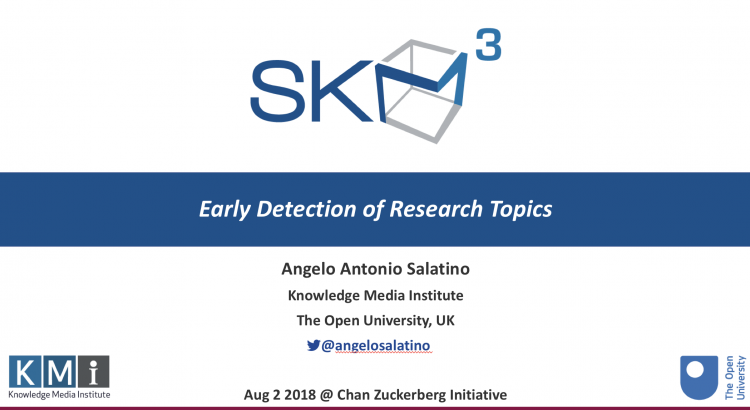On 2nd of August 2018, I have been invited by Boris Veytsman, Principal Research Scientist at Chan Zuckerberg Initiative (formerly Meta), to give a talk about my PhD work.
Differently from my previous talk to the ORNL group, I had the opportunity to describe my doctoral work more comprehensively.
More specifically, I initially showed what is available in the state of the art regarding the evolution of science and how new research topics usually emerge. Then, I showed them with details my initial study (published on PeerJ) and Augur (published at JCDL 2018) for the effective prediction of new emerging trends.
Slides
Here are the slides I used to present my work:
Media
Excited today, in less than one hour I’ll give a webinar to Chan Zuckerberg Meta @meta “Early Detection of Research Topics” … @skm3ou @BorisVeytsman pic.twitter.com/X1HPBVkDgz
— Angelo A. Salatino (@angelosalatino) 2 August 2018
We are very excited about your approach
— Boris Veytsman (@BorisVeytsman) 2 August 2018
References
- Salatino, Angelo A., Francesco Osborne, and Enrico Motta. “How are topics born? Understanding the research dynamics preceding the emergence of new areas.” PeerJ Computer Science3 (2017): e119. https://peerj.com/articles/cs-119/
- Salatino, Angelo, Francesco Osborne, and Enrico Motta. “AUGUR: Forecasting the Emergence of New Research Topics.” JCDL’18: The 18th ACM/IEEE Joint Conference on Digital Libraries. ACM, Fort Worth, TX, USA, 2018.
- Salatino, Angelo A., Thiviyan Thanapalasingam, Andrea Mannocci, Francesco Osborne, and Enrico Motta. “The Computer Science Ontology: A Large-Scale Taxonomy of Research Areas.” In ISWC 2018, Monterey, CA, USA.
- Osborne, F. and Motta, E.: “Klink-2: integrating multiple web sources to generate semantic topic networks.” In ISWC 2015, Bethlehem, PA, USA



